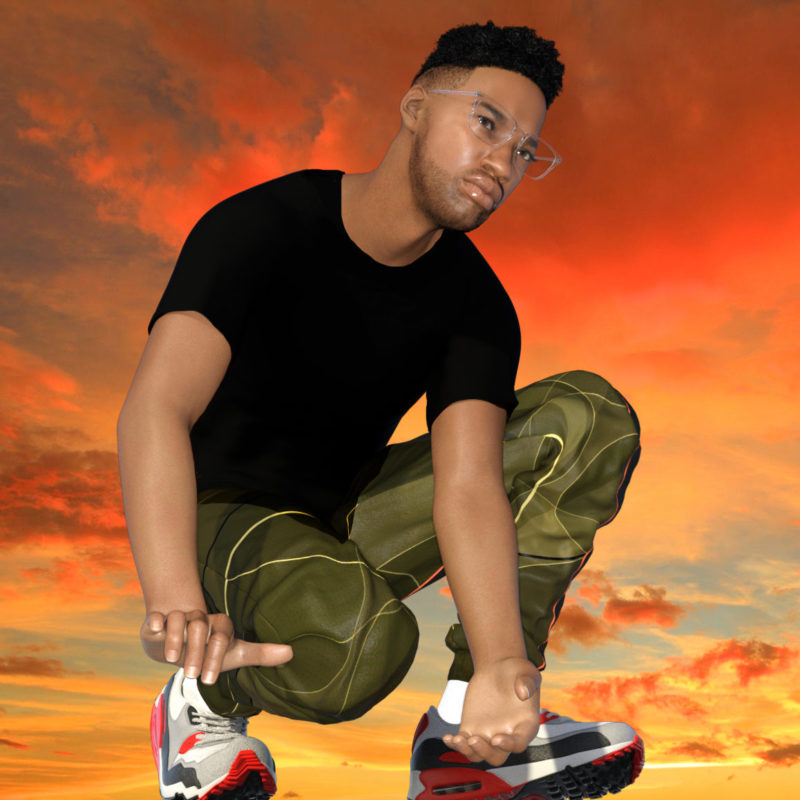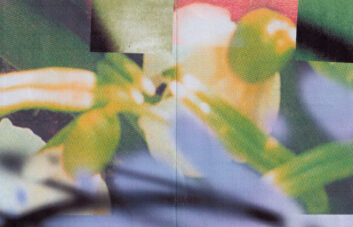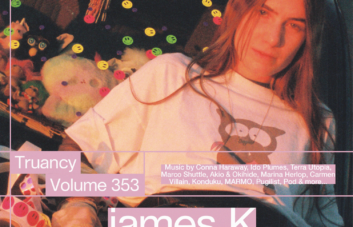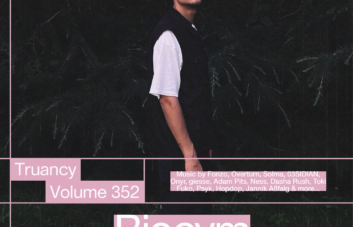London-based artist patten is difficult to put your finger on. Whilst known for the variety of his creative outlets – from AV shows and video production to art installations – he’s been consistently dropping music for over a decade. His ability to blend seemingly unblendable sounds landed him on Warp Records early in the 2010s, and he’s been releasing bold music ever since. Through his self-released RE-EDITS series he’s steadily honed in on a bass-heavy sound which moves across genres but remains fit for the dancefloor. The most luscious of which, a footwork edit of Frank Ocean’s “Nights”, achieved the unthinkable by successfully matching the original cut from Blonde’s grace.
In 2019, he announced his new imprint 555-5555 with the release of FLEX. Drawing on grime, jungle, bass and experimental music, his latest FLEX stays true to its title by blending many styles in a way which still makes sense in a club setting. One review commended the record’s ability to create forward-thinking club music “without losing track of old school rave values”. His hard-hitting, angular club mix for Crack is indicative of his ability to DJ in unpredictable ways, with calls to Burial and Joy O meshed with anything from GRRL to Rico Nasty. After catching him during a rhythmic, bass-heavy DJ set in Berlin’s Trauma Bar last year, it felt like a good time to catch up. We covered the freedom and restrictions of being a cross-disciplinary artist, FLEX and his increasing appetite for DJing.
In recent times, the presentation of artists has increasingly placed them centre-stage. Whereas with patten, the notion of the artist is much more shrouded with shadow in images, spanning across art forms and genres. For what reason do you take this amorphous, evasive, less tightly-defined form?
Maybe it’s always been like that – images have always been a big thing. Like when you get really into some tunes, you kinda want more. That’s all good I reckon – why not? It’s a natural thing. If that’s a record sleeve or liner notes or a live show, it’s all the same really. With patten, it’s never been about not showing, just trying to show something else.
You could argue that language in art is somewhat unprepared for this kind of cross-genre, cross-disciplinary artist. How do you feel about attempts to characterise your art? Is there a way you would prefer it to be experienced which moves away from a language-based definition or characterisation?
Words are words but I guess how it feels is the main thing. It’s been cool with the first FLEX live AV sets, seeing people respond to music and visuals they’d never seen or heard before in a really genuine way. Not just people who are mad into stuff, but just people out with their mates at a random club or festival or whatever. That’s the main thing, like what really happens out there without prompting or lead up. What it means to people coming to it fresh.
Art which spans such a range can give a feeling of unending freedom and possibility to the creative process. What are the boundaries of this new cross-disciplinary form? Is there a limit to the possibilities? How do you decide what is too much or too far?
There’s really no limit to where you can go with it on the ideas side, and no decisions apart from what you want to do. There’s no rules. It’s just, what do you want it to be? What do you want to do? That’s all there is. Today, your drive, your energy, your time. That’s basically it. Obviously time relates to money and that’s a limit you can’t avoid. How do you earn the time to do the things you want to do? No easy answer to that. Then there’s everyone else’s time, and if anyone wants to use any of theirs checking out what you made. If they do, you’re pretty lucky. There’s a lot of really good stuff that nobody talks about and hardly anyone knows about. All of that has an impact, so sometimes things take people a while to get done, juggling a bunch in the background, but we get there eventually.
You could think about that freedom in relation to technology too. In some ways our information is being condensed and robotised, processes restricting our freedom and exposure to new experiences. Your work is a case whereby technology and interconnectedness are used to create new possibilities for self-exploration. How do you relate yourself as an artist to the freedoms opened up by technology?
Freedom’s a massive, massive thing. It’s everything. It’s way beyond us talking here or music or whatever. Freedom to live how you want. Freedom to do what you feel you should. It’s a battle. The years, the hours, the minutes – a life. The choice in all of that. It’s delicate. Nothing’s guaranteed. It’s a scary moment right now and a lot’s being eroded, but I guess we’ve got to be hopeful. We have to work together to steer things. There’s a big sea change I think just around the corner.
The flexibility of your work has taken new forms this past year, such as your release FLEX: videos, installations, zines, a custom perfume, stage design, skateboards, apparel, etc. How do these various art forms relate to each other in the world of the album?
It’s in the title I guess, FLEX – like unfixed, liquid. All of the shapes it’s taking are really connected in different ways, so it’s just maybe pretty honest. It’s the boundaries that are weird. It’s like what are those even all about? I like the idea of looking at the same thing from loads of different angles, like how can a scent, or a live show kind of look at the same thing somehow. Just moving ideas from one form to another.
Your music video “Night Vision” features human shapes in unhuman forms, with themes overlapping between your visual art and music. Is there an intention to explore the boundaries of the human versus the unhuman, or the natural versus the unnatural, within your works?
It’s not really a fixed intention as much as just what always felt right and honest at the time. I can’t help seeing that video as a kind of love letter.
Earlier this year I saw you perform a DJ set – it felt apt that the night was diverse and did little in conforming to a conventional dance party. How do you reconcile yourself as an artist with the venues and parties where you perform when DJing?
DJing is sick. Clubs and being out with those soundsystems and spaces and people is mad. There’s whole other worlds within worlds out there. I’m more into DJing nowadays than ever before. There’s an energy to a lot of the music coming out that’s just beyond, and regular people are up for so much. It’s not just like total music heads or whatever – it’s that thing again, just people out to feel something. That’s how things have changed in the past however long and it’s fucking exciting.
patten: Instagram, Bandcamp, Soundcloud, Youtube, 555-5555 Forum
patten DJs at new London night inklingroom on March 6th and plays live at Cafe OTO with Loraine James on March 27th.




